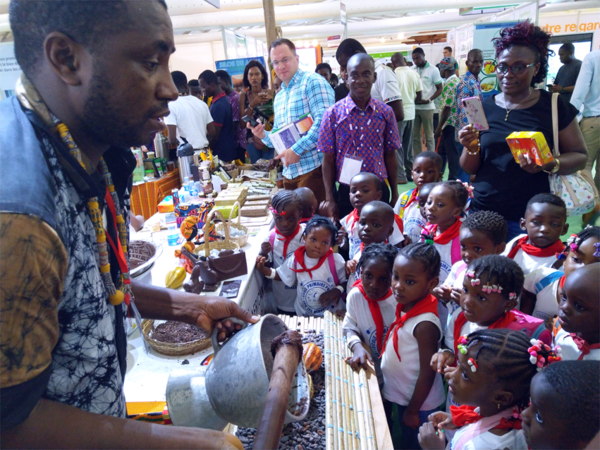- Share this article
- Subscribe to our newsletter
Germany at the West African agricultural trade fair SARA
The Ivoirian international agricultural trade fair Salon de l’Agriculture et des Ressources Animales (SARA – International Exhibition of Agriculture and Animal Resources) is the largest event of its kind in West Africa and attracts a broad audience. Between the 22nd November and the 1st December 2019, more than 300,000 visitors learnt about topics, trends and technologies in the African agriculture and food sector. Among the visitors were consumers from Abidjan and the region, school classes with pupils of different ages, business people and government representatives. The Ivoirian President Alassane Ouattara, African ministers of agriculture from different countries and the German Ambassador in Côte d’Ivoire where among the most prominent visitors. They all came to get informed, to present, to discuss and to also test a wide range of agricultural products.
SARA is part of the international trade fair program of the German Federal Ministry of Food and Agriculture (BMEL) to present German technology of agricultural sector abroad under the trademark “Made in Germany”. 2019 was the first time that the German Federal Ministry of Economic Cooperation and Development (BMZ) and the BMEL jointly organised a German pavilion, which Deutsche Gesellschaft für internationale Zusammenarbeit (GIZ) put into action with “Messe Leipzig”.
Together with six German private companies, ten African small and medium enterprises as well as various national and international partner organisations of German development projects were represented at the pavilion. A broad audience could get an own impression about innovation and international cooperation with a total of eleven project stands. Most of the stands representing cooperation projects set their special focus on sustainable cocoa production. Cocoa takes a central position in Côte d’Ivoire’s agriculture. With 40 per cent of the global production, this West African country has become the largest exporter of cocoa beans over the last years – however, this was only achieved at the expense of massive deforestation, the loss of soil fertility and biodiversity, and the use of child labour.
Germany ‘s contribution to sustainable cocoa cultivation
Germanies development cooperation tackles the issue of sustainable cocoa production on different levels. Two prominent projects that Germany is running in Côte d’Ivoire with its partners – Green Innovation Centres for the Agriculture and Food Sector (GIAE) und PRO-PLANTEURS – presented tangible results and gave impressions of day-to-day activities to the visitors. Both projects are working with the aim of increasing the incomes of smallholder farmers and of promoting ecologically and socially sustainable cocoa growing practices. Visitors got a better insight through participation in quiz or other interactive games, short videos sequences and of course direct talks to project staff.
At the GIAE stand, visitors especially got informed on the investments that the project in Côte d’Ivoire made to create additional opportunities for smallholders for incomes generation and to maintain the productivity of their whole farming system. The diversification in food crops is one quick option while the introduction of cocoa based agroforestry systems by using shade trees is more a long-term option. Three regional councils in Côte d’Ivoire already committed themselves to participate in a so-called jurisdictional approach to declare and implement zero-deforestation regions. Cocoa and other products sourced from these regions must comply with sustainability criteria set on a regional and not on a production unit level. Opportunities in value addition through local processing were another hot topic. The Green Innovation Center project invited representatives of the partnering co-operatives to run the GIZ info point for one day and to present their innovative waste and by-products from cocoa production and processing, such as compost from the cocoa husks, soap from cocoa butter, juice and sheathed beans.
At the PRO-PLANTEURS stand, Madame Yelli Niamin presented her counselling activities to promote better diets for the whole cocoa farmer household. The PRO-PLANTEURS rural nutrition counsellors attracted visitors with a quiz on food topics and explained the importance of this issue in Côte d’Ivoire.
The African Cocoa Platform financed by GIAE highlighted the topic of cocoa processing by inviting chocolate manufacturers from five West and Central African countries who offered a wide range of their products. These included cashew nuts coated in chocolate from Côte d’Ivoire, cocoa butter from Cameroon and “Africa chocolate” with a sensitivity to high temperatures from Togo.
The chocolate value chain
Most of the actors are social entrepreneurs who manufacture chocolate in a bean to bar process on a sustainable and fair basis – they know all the steps in the value chain and thrive on their own quality. On the ten trade fair days, they sold a total of 75 kilograms of chocolate and 500 packs of various cocoa products, thus creating their own highlight of the year in terms of market development.
At the same stand, the Choco plus training centre from Côte d’Ivoire demonstrated fascinated school classes the most important steps in local processing of chocolate at a choco lab. At the end they earned their own piece of bean to bar chocolate.
The “Forum Nachhaltiger Kakao” (German Initiative on Sustainable Cocoa), one of the project partners of PRO-PLANTEURS, was also represented at the trade fair. This multi-stakeholder platform gave an account of its local activities aimed at a sustainable cocoa value chain and its new objective, and with its background report on child labour in the West African cocoa sector, it presented one of its chief concerns.
Authors:
Arne Schuffenhauer, Frank Fromme, Lucia Vogel, Dagmar Seyfert
Deutsche Gesellschaft für internationale Zusammenarbeit (giz) GmbH, Bonn, Germany
Contact: <link arne.schuffenhauer@giz.de>arne.schuffenhauer@giz.de</link>
More information:
SARA: sara.ci
GIZ website – Programme for sustainable supply chains and standards: <link www.giz.de/en/worldwide/77960.html>https://www.giz.de/en/worldwide/77960.html</link>
GIZ website – Green Innovation Centres for the agriculture and food sector:
<link www.giz.de/de/weltweit/78984.html>https://www.giz.de/de/weltweit/78984.html</link>
Forum nachhaltiger Kakao:
<link www.kakaoforum.de/ueber-uns/unsere-ziele/>https://www.kakaoforum.de/ueber-uns/unsere-ziele/</link>





Add a comment
Be the First to Comment